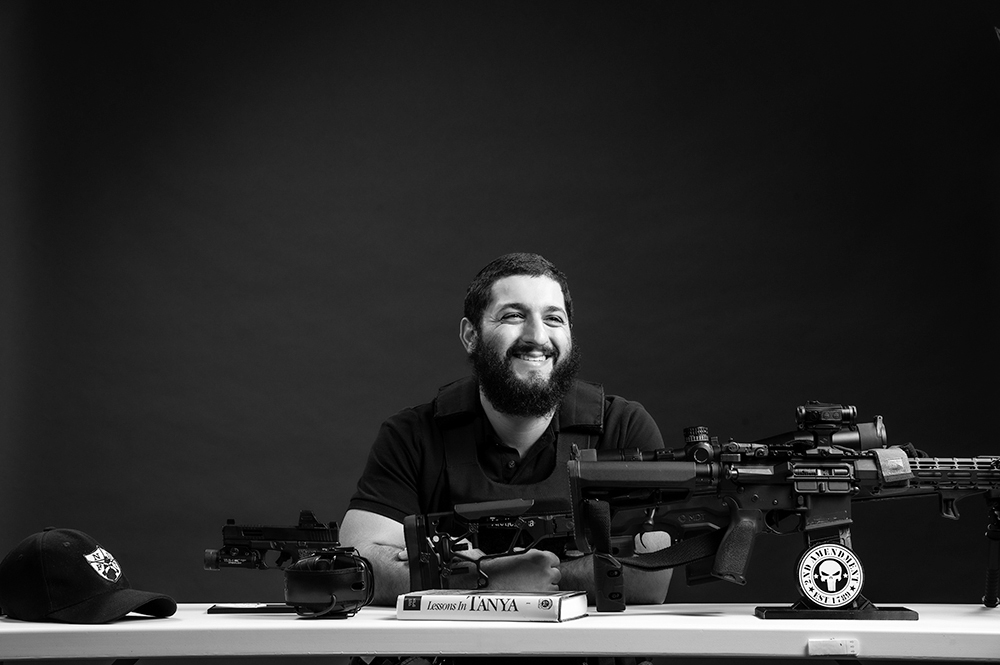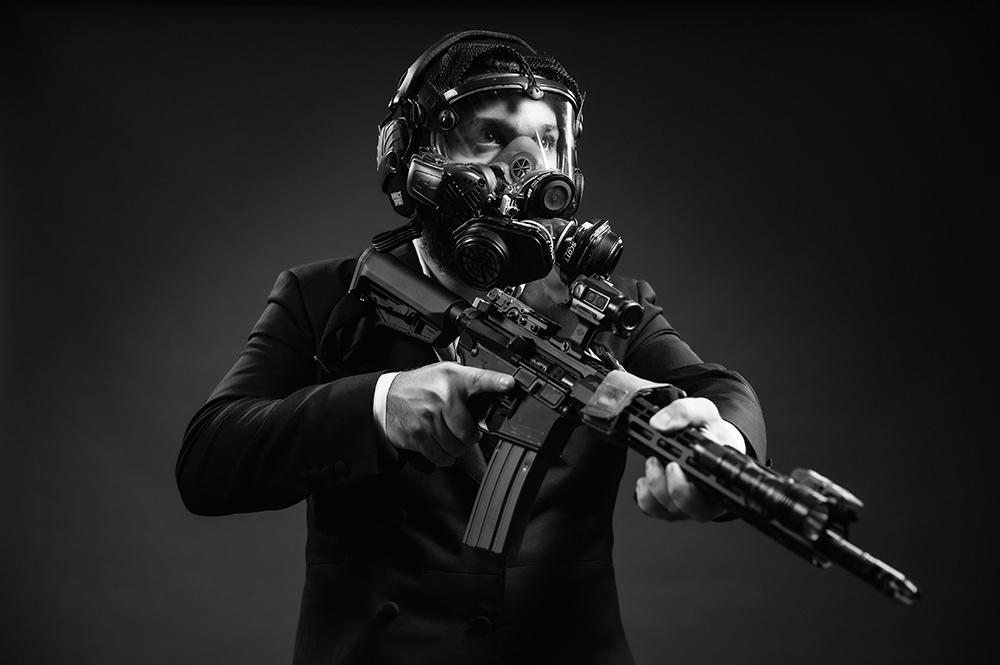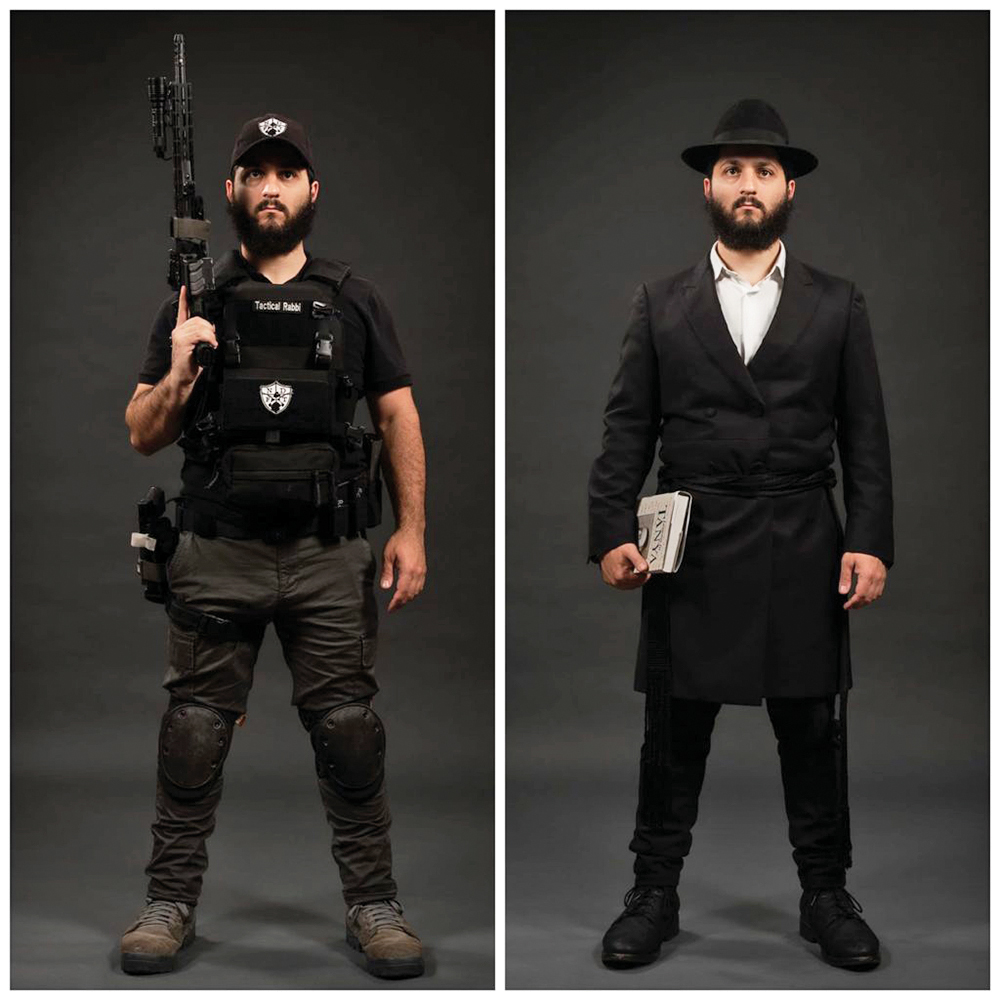
Growing up in Los Angeles, Rabbi Raziel Cohen had some tough experiences. His parents, who were part of the Chabad Lubavitch community in Los Angeles, ran an organization from their home called Global Kindness, whose goal was to help impoverished people have better lives. “But when you’re dealing with people who are at the bottom, you also end up dealing with people hooked on narcotics and people with mental illness,” said Rabbi Cohen. “So, before I turned 18, we had 14 attempted break-ins and two attempted murders.”
People looked at the Cohen family’s home as an easy target because merchandise and clothing were being stored there. “After the many experiences I had with that, my mentality took on the adage: Don’t mistake my kindness for weakness,” said Rabbi Cohen. “Just because we’re doing the right thing doesn’t mean we will be the victims of the people we’re working with.”
As soon as the young man turned 18, he purchased his first firearm. He took as many courses as he could to gain knowledge and skills. His interest and passion grew as he attended yeshiva, and ultimately received his rabbinical ordination. In 2019, Rabbi Cohen started a business in firearms training. His extensive training classes, both indoors and outdoors, one-on-one and in groups, include renowned programs like Magpul Dynamics, Tactical Response, GoRuck Counterterrorism and Condition Gray.
Rabbi Cohen reflected that his business really took off when he unexpectedly received publicity in 2019. There had been a series of active shootings all over the U.S., several of them in shuls, including the active shooting in the Chabad in Poway, California. The rabbi printed flyers advertising a free seminar in firearms knowledge, and posted them around LA. One hundred thirty people showed up, including a journalist for the Los Angeles Times. The next morning, to Rabbi Cohen’s astonishment, he was on the front page of the newspaper, with an article calling him the “Tactical Rabbi.” He was pleased with this title, as he felt it combined his two areas of study.

During the first couple of years, a wide variety of people attended his classes, especially his most popular “active shooter” class. The attendees included security officers and law enforcement officials, but also rabbis, priests and regular civilians. “Anyone from a locksmith or electrician to a surgeon—regular, ordinary people, not necessarily who you would perceive as the type to own firearms,” said Rabbi Cohen. “Just people trying to stay safe, who realized that they can’t rely on law enforcement alone.”
Rabbi Cohen relayed that many expressed frustration and fear as their motive to learn. “When you call 911 and tell them something is happening, you then have to wait for them to respond. The slogan of my company has been: ‘Bridging the gap between when something begins and when law enforcement arrives.’”
During COVID, Rabbi Cohen said, people told him stories of calling 911 and saying, “There’s a BLM riot happening now, right outside of my house.” The police would respond, “Sorry, you’re on your own.” The rabbi explained that it’s not because the police didn’t care; they simply couldn’t help the individuals calling because there were 10,000 people outside who couldn’t be easily controlled. The large groups were their priority in those moments. “People started to realize: Nobody is coming to help me, so I need to take steps to be able to protect my family and myself.”
When asked if it ever feels contradictory being both a religious leader and a firearms instructor, Rabbi Cohen explained: “People don’t realize how much being a rabbi and a firearms instructor have to do with each other. It says in the Torah that you’re not allowed to stand by and watch your brother get hurt in a bad situation. We have an obligation to stop things from happening. It’s part of who we are.
“One of the most common questions people ask me in interviews is: ‘Doesn’t it say in the Bible, ‘Thou shalt not kill?’ I answer: ‘It’s not ‘Thou shalt not kill’; it’s ‘Thou shalt not murder.’ Throughout Jewish history, we have had bad situations put in front of us, when it was our life or the attackers,’ and we had to do what we needed to survive. When it comes to self-defense, we can do what we need to do.”
One trainee reflected: “When I train with the Tactical Rabbi, I feel like it’s more than coming to a formal training. In a way, it’s very therapeutic. You literally have to forget about everything in your life. You’re just training now. You just have your target in front of you.”
In addition to providing firearms training, Rabbi Cohen, approved by Homeland Security and the Department of Justice, performs security assessments for buildings. “You often don’t need a high budget to make schools and synagogues more secure. Structural security and drills with staff and kids in schools is not difficult to achieve.”
When asked how he feels about synagogues prohibiting their members from bringing firearms to shul, Rabbi Cohen said: “If a group of members with guns create a real security team and train together with a high level proficiency, that’s awesome. But if the shul is dealing with a bunch of members who just got their conceal-and-carry licenses but don’t know how to work together and communicate as a team, they are potentially more of a liability than an asset. These matters need to be very carefully considered, because you don’t want to risk civilian casualties.”

A rabbi of a synagogue fortified by Rabbi Cohen said: “If you have a skill set that could enhance people’s experience of Judaism and you don’t use it, you’re not using your God-given talent to illuminate the world. The Tactical Rabbi has a passion, and he didn’t ignore it. He used that passion to bring light to many communities—to allow people to come into their synagogues and pray comfortably without worrying.”
Over the course of this summer, Rabbi Cohen will be offering many types of firearm courses: These courses will run the gamut from training classes for people with no experience in firearms who are trying to figure out what kind of firearm to purchase, to advanced training courses for those with a strong background in firearms. This includes pistol classes, rifle classes, active shooter classes, and integration with conceal-carry. The main range where these classes are offered are in Henryville, PA, an hour away from Teaneck. The classes will start to be available next week, and throughout the summer.
For more information on Rabbi Raziel Cohen, check: YouTube and Instagram:
@thetacticalrabbi or visit his website, www.thetacticalrabbi.com
Dassi Lewis is a staff writer at The Jewish Link.








